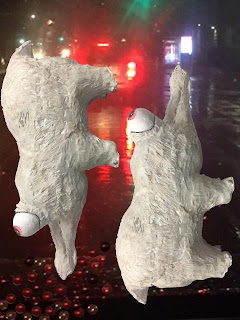
Its May 28th, and I am spending the day thinking about the past two years, and what they have meant. Granted, I am one class short, but my class graduates today, and I am compelled to share with them in spirit. I find myself unsure of how to place this event, as my successes seem to occur more on a moment to moment basis, rather than in milestones. But I would like to try.
My thesis project is comprised of a multi-dimension body of work as an accompaniment to a narrative poem. The title is "Felcanography". The poem is called, "Rime of the Dead Science-Man", and it is the story of an ambitious and corrupt geneticist who is inspired to breed a dog with a cat to create the Felcan (feline + canine = Felcan). He believes it will be "the cutest pet ever." The Felcan is sexless, albino, slightly amorphous, not so cute, and oddly phlegmatic - that is, unresponsive. It is also deaf. It has few instincts, but many superpowers. It cannot mate, so it is evolved, but endangered. I do not know what the original impetus was to endow the characters with these qualities, but meaning has revealed itself to me in a great many layers through the time of the project's development.
If you know me, you know how much going to graduate school meant to me. Also, you know about the challenges I face as an individual, possibly better than I do. One of our first readings was "Death of the Author" by Roland Barthes. This essay is a short summation of the shift in literary critical theory from its emphasis on the writer, to the emphasis on the reader. That the interpretation of the material supersedes its intent, is an outgrowth of post-modern acknowledgement of the unsung cultures, challenges, and triumphs overshadowed by the hierarchical powers that be, and have been. I wonder about the ability of the average person to decipher meaning, as much as I wonder about my own. Is it possible someone can look at my work, or I can look at someone else's work, and have a more profound experience with its expression than the maker had making it? Different experience, for sure, but more profound, I think not.
I was told the work needed to be "about something". I cobbled together the narrative, and decided my work would be about the story. I began by planning the Felcan to be as pared down of defining qualities as possible. This was a backlash against the amplified portioning of people into groups that is going on all around us and is propagated by almost all media. I wanted, through the formlessness of the Felcan to acknowledge the individual within any group. It looks like no specific animal, but can be said to resemble a variety of possible animals, including ducks, wombats, and mole rats, or crocodiles. The felcan has no memory, except for "working memory", therefore it is incapable of judgement. The thoughts are gone as soon as they come. This was a nod to objective thinking, which barely exists due to our unavoidable cognitive biases.
I struggled a little with knowing how to conduct myself on a largely minority campus. I felt silenced in classes when discussion of race came up, because I did not want to even take the chance of saying the wrong thing. It was suggested to me that I read a book called "White Fragility" by Robin DiAngelo. I learned from this book, that to dis-acknowledge race is a mistake that white people make because we have the luxury of not thinking about it. I felt certain that I was sending out the wrong message, and shored up my championing of the individual. I am not sure if I was successful in this!
One of the great things about our program at Brooklyn College is the opportunity through events and visitations to get genuine feedback from other people. I was tremendously moved by what flowed back to me, and put it back into the work. There were times I felt like the Felcan was me, all alone and very much misunderstood, or that I was the Science-Man with his hubris and myopic determination. I got a lesson in humility, that I did not expect. I was pushed to explain the work, which told me the work does not speak for itself, and this was frustrating and dashed my hopes of art being my only language.
Along with emphasis on the individual came the exploration of the phenomena of "uniqueness". I truly believe that expression and uniqueness go hand in hand, and that somehow this is connected to freedom. I deliberately made each piece as distinct from the last as possible. This created the problem of how to unite them. So came the poem.
As much as I do not know how to celebrate graduation, I do know that the moments I spent in my school studio, before that time was cut short by Corvid-19, were among the most free and happy I have ever known! It actually feels good saying that. I am so grateful that I had a chance to feel that particular way, in a big well-lit studio with lots of tables and room to make a mess.
Love,
Marlene
 |
| Corvid Blush, 2020 30" x 22" Hair dye, Urban Decay Blush, oil paint on Vellum. |


